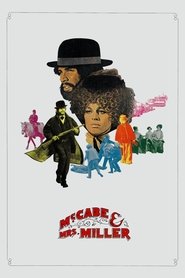The noted film critic Roger Ebert called McCabe & Mrs. Miller “one of the saddest films I have ever seen, filled with a yearning for love and home that will not ever come.” Yet whilst it is difficult to disagree with his sentiment, Ebert’s choice of “sad” is somehow not quite right. Indeed, I’ve long regretted that our dictionaries don’t have more nuanced blends of tragedy and sadness. Perhaps the Ancient Greeks can loan us one in the meantime.
The plot of this film is of a gambler and a prostitute who become business partners in a new and remote mining town called Presbyterian Church. As their town and enterprise booms, however, it comes to the attention of a large mining corporation who want to buy or bully there way into the action. What makes this film stand out is not the plot itself, though, but its mood and tone: the town and its inhabitants seem to be thrown together out of raw lumber, covered alternatively in mud or frozen ice, and their days (and their personalities) are short and dark in equal measure.
As a brief aside, if you haven’t seen a Roger Altman film before, this has all the trappings of being a good introduction. As Ebert went on to observe: “This is not the kind of movie where the characters are introduced. They are all already here.” Furthermore, we can see some of Altman’s trademark overlapping conversations, a superb handling of an ensemble cast, and a quietly subversive view of the tyranny of ‘genre’… and the latter in a time when the appetite for revisionist portrays of the West was not very pronounced. However, all of these ‘Altmanian’ trademarks can be ordered in much stronger measures in later films: in particular, his comedy-drama Nashville (1975) has 24 main characters and my jejune interpretation of Gosford Park (2001) is that it seems purposefully designed to poke fun those who take a reductionist view of ‘genre’, or at least on the audience’s expectations. (In this case, an Edwardian-era English murder mystery in the style of Agatha Christie where no murder or detection really takes place.)
On the other hand, McCabe & Mrs. Miller is actually a poor introduction to Altman. The story is told in a suitable deliberate and slow tempo, and the two stars of the film are shown thoroughly defrocked of any ‘star’ status in both a visual and moral sense. All of these traits are, however, the film’s strength, for they perform skilfully for a credible, fascinating and riveting portrayal of the old West.
It’s no mistake that the film is titled as it is, with an ampersand rather than an “and,” pointing specifically to the business venture the duo are engaged in. [But] just as McCabe’s hyper-masculine persona is revealed as an empty front, so too is the ideal of the independent American small business and the institutions responsible for protecting those with less influence and capital than those in power. [In] deconstructing the norms and tropes of the Western, Altman presents the American Dream as a false promise dealt from a stacked deck, with institutional safeguards protecting ordinary citizens only so far as their exploits don’t interfere with the inexhaustible wealth and power of private equity. After all, it’s their American Dream that’s the only one that’s ever been real.
— Derek Smith (Spectrum Culture)
At certain points in the story, particularly early on, the footsteps are louder than the dialogue, and there are stretches when you can’t make out any single word. It is imperfect and messy, just like the frontier, just like the film itself, just like life. In McCabe & Mrs. Miller, Altman did not so much reproduce a lost past as create a new world, with its own logic and texture. This is the source of the film’s honesty, which is to say its beauty.[…]
Altman [keeps] returning to downtrodden characters who are terrified of failure but sorely unprepared for prosperity.
— Nathaniel Rich (Criterion)
It’s evasive to discuss McCabe & Mrs. Miller merely as a series of haunting flourishes, as it always is when considering Altman’s work. The brilliance of his filmography resides in its mysterious majesty—in how his inspired individual decisions, intuitive yet relatively straightforward in isolation, cumulatively yield something beyond the sum of their considerable parts. One returns to painting and music to establish proper contextualizing corollaries, as they tap emotion within us that can’t be entirely tethered to experience and perspective.
— Chuck Bowen (Slant Magazine)
McCabe is unheroic, shooting both the Kid and Breed in the back, and playing possum to blindside Butler at point blank range in the forehead. While Butler believed McCabe had never killed anyone in his life, perhaps he overlooked the sly, cowardly abilities of a fearful man.
35mm print.

